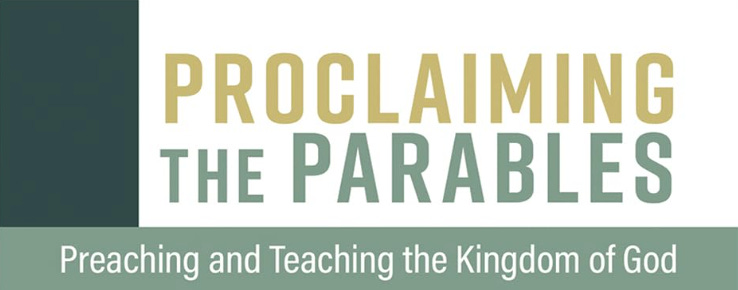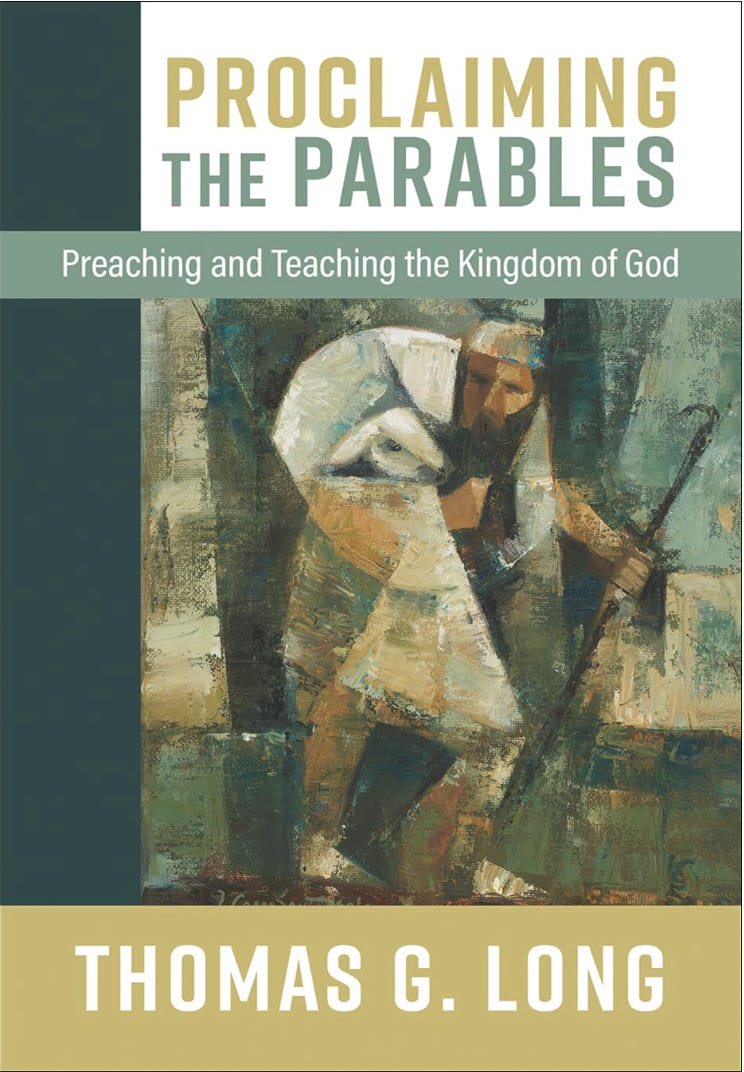One of the best kinds of books that you can find is a book written by a teacher or professor who has been teaching the subject for decades. Welcome to Thomas G. Long's new book, Proclaiming the Parables. I’m a huge fan of Long’s preaching, and this book opens the door for all to listen in to his classrooms – where he taught preaching the parables for more than four decades. His book reveals a long life of interacting with the top level of scholarship on the parables, while he guides us through parables with insights for every preacher.
Today’s Substack whets the appetite for his book. Anyway, preachers and teachers, buy this book. It’s a goldmine.
Perhaps the most interesting feature of his discussion of the parables of Jesus on the “playground of the scholars” is his own journey from hearing and believing and teaching that the parables’ literary form – their storied nature, their narrative nature, their surprises and shocks – did not lead to great sermons on the parables. What did he find that did lead to the power of the parables? I’ll get there below.
First, scholars had to bash allegory. Often by believing that the allegorical interpretations of Jesus’ parables, even in say Matthew 13, were not from Jesus. The history of using the allegorical method became a no-go street following the work of Adolf Jülicher, who found a simple teaching in each parable – a simple teaching that sounded very much like German liberal theology.
Long finds Jülicher wanting: he didn’t allow Jesus to be Jewish; his understanding of the parables were far too simplistic. He’s got a quotable: “People who say things like that don't get crucified; they get tenure.” Or pulpits for a church people looking for smooth things. And Jülicher traveled down the literary path.
Long then discusses SBL’s Parable Seminar and the work of John Dominic Crossan. It pushed against Jülicher and it found the literary art of the parables, and any reading of that scholarship knows it found brilliance at times. He summarizes Crossan with the language Crossan himself used so cleverly: “Jesus wasn't killed because he spoke in parables; he was killed because he believed parables, saw the world parabolically, and acted according to the powerful vision generated by parables.”
Long lost faith in that scholarship. “Slowly I began to realize that the seminar’s whole approach to parabolic speech was highly hyperbolic.” Ooofta, what a way of putting it. That is, “if someone were to run on stage at the Super bowl halftime show, steal the mic… and, before security muscled them off, were to recite to the startled crowd one of Jesus’ parables … the crowd would probably be confused, perhaps intrigued, but would almost surely not experience mythical shock, transformation, a loss of control, and their lives being torn apart.”
Here's his discovery: “the real power of the parables is not in the naked parables as performance art or in the recesses of the metaphorical process alone, but somewhere else.” Where then?
“The main power of parables is in their capacity to point to what God is doing in the world, that is, to the Kingdom of God. The power is not in the trope gamma but in the referent.” Again, “It is not a parable, however vivid and full of divine wisdom, that saves us, but Christ.”
So Long, when he came to Yogi Berra’s famous fork in the road, walked the literary path, but later he had to retrace his steps to take the other path, the theological-kingdom path. He appeals to Robert Funk’s view, and sorts it out like this: “the real shock generated by parables is in the transference between what happens in the parable and a vision of the life of God.”
The parables are about God and God’s kingdom as taught by Jesus. “There is reciprocity here. The way we interpret the parable shapes what we understand of God's Kingdom, and then what we understand of God's Kingdom repays the favor, governing how we interpret the parables.” This is so very true.
The kingdom of God is an event, not an idea. Parables “take us to another and greater event: the places in our lives and world where God is acting.” This inbreaking of God, this kingdom, “is a perpetual revolution.” “The world is changed when God advents.” Long is quite Barthian in some of his themes about the kingdom of God. So he has three themes to kingdom:
1. “The kingdom of God is a revolutionary event initiated by God”
2. The kingdom of God “creates an event, a troubling of the water in human life and history, a toppling of some proud earthly reign.”
3. The “event of the Kingdom of God is perceived by some and generates a response. It creates a community of participants, ‘citizens’ of the Kingdom as it were, who are drawn into relationship with each other and who seek to adopt practices, customs, ways of speaking and living congruent with what God is doing in the world.”
Join me in reading and discussing portions of this book.






Sounds like wonderful plate of food to savor the appetite, nourish mind, heart and soul; and help us sing the song to inspire ways to live more wholly/holy (whichever fits the needed perception. Thank you Chef Thomas Long for this plate, and Scot for sharing it. Bless us to digest it one bite at a time.
Sounds like wonderful plate of food to savor the appetite, nourish mind, heart and soul; and help us sing the song to inspire ways to live more wholly/holy (whichever fits the needed perception. Thank you Chef Thomas Long for this plate, and Scot for sharing it. Bless us to digest it one bite at a time.